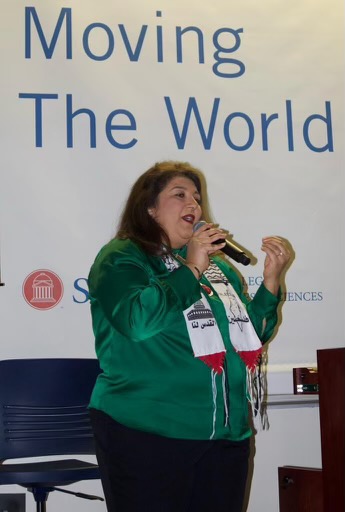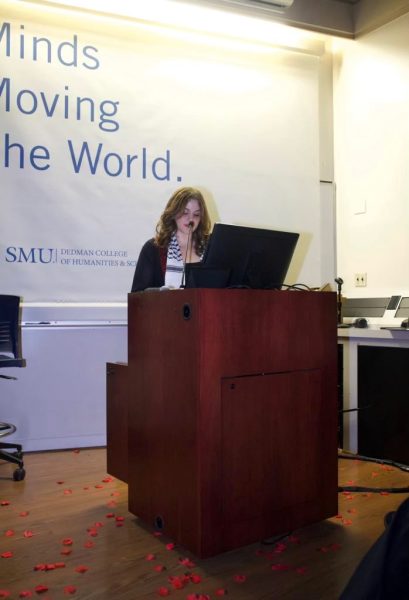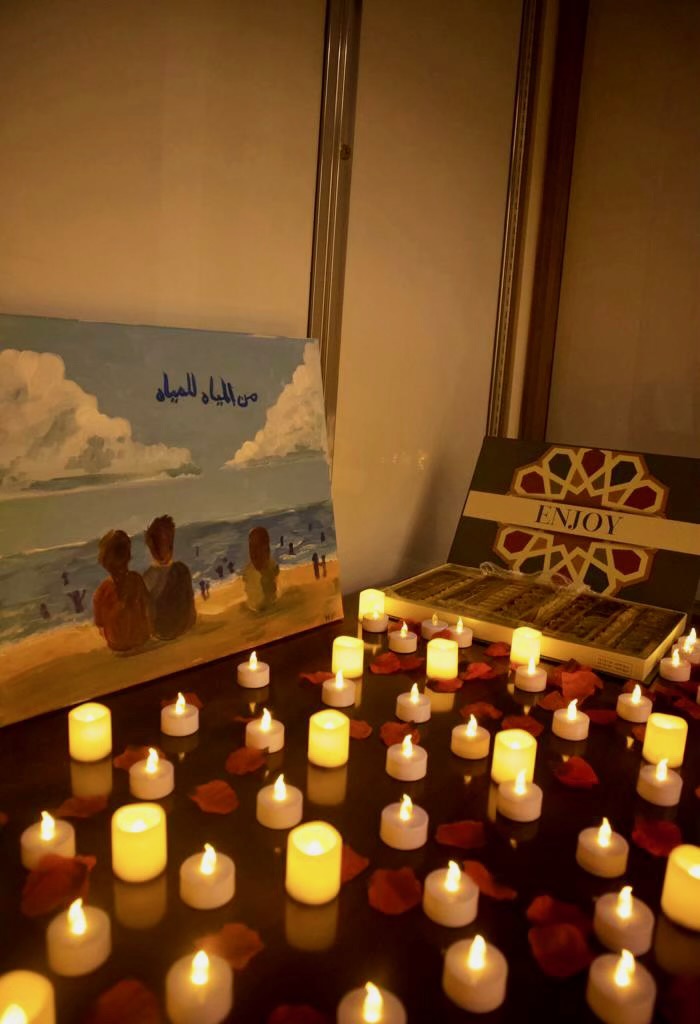Candles filled the auditorium and 11,000 rose petals covered the floor. Each petal represented a Palestinian life lost in Gaza.
The Palestinian Solidarity Committee (PSC) held a vigil in McCord Auditorium on Nov. 29 to commemorate the deaths. Since then, the death toll in Gaza has nearly doubled, surpassing 21,000, according to the Gazan health ministry.
The vigil began with two prayers: one Christian and one Muslim.
Powerful traditional Palestinian songs echoed through the room.

Palestinian singer Nisreen Hajaj sang a song called, “Ya Bahriya,” a freedom song used in Arab revolutions about Palestinian fishermen throwing their nets into the sea and catching fish. It tells Palestinian sailors to “stay strong” and alludes to prior to Oct. 7 when fishermen in Gaza could only access a small portion of the sea, totaling only 21 miles, due to Israeli blockades.
Now, in the midst of a war, fishing is a dream of the past. The dream instead, is to live.
As students on campus are mourning lives already lost in the war, board members said they find themselves mourning lives that have not yet been taken.
PSC executive board member Manar Abusaad purchased the rose petals for the vigil when the death toll was 11,000. By the time the event came around, Abusaad said the death toll was 12,000.
Executive board members also recalled how filled the floor was, worried that someone could slip on the petals. Executive board member Laila Abdelghany says PSC considered doing something other than petals.
“We had the idea of doing marbles and dropping them slowly into a jar. We had the idea of doing a paperclip display, but because of the sheer amount we couldn’t,” Abdelghany said. “Where are we going to get 10,000 paperclips? Where are we going to get 10,000 marbles? How long is that going to take to drop into a jar?”
The vigil also featured guest speaker Noor Muhanna, a student at UT Dallas. Muhanna lost 10 family members in Gaza. In tears, she shared memories and the lost hopes and dreams of her family.
“Basel Mahdi, Raed, Iman, Sameera, Yousef, Ahmad, Amr, Abdelrahman, Mohammad, and Mira Mahdi. 10 names and 10 cherished lives who have departed from this evil world and are now part of the statistics of this painful tragedy,” Muhanna shared in a speech at the vigil. “As I sat in my room trying to write this, I quickly found myself overwhelmed with tears and at a loss for words. It’s not fair. None of this is fair.”
Executive board member Sally Ayass also spoke at the vigil. At the end of her speech, she shared a poem from Palestinian Mahmoud Darwish. A translation reads: “Blessed are the birds in their cages. For they, at least, know the limits of their prisons.”

Since Oct. 7, 21,823 Palestinian people have been killed, 8,800 of them children and 6,300 women. More than 7,000 people are missing.
There have been conflicts in this region for the past century, but this is the heaviest Arab loss of life in conflicts with Israel the region has seen for over 40 years
Survivor’s Guilt
Abdelghany says the number one emotion she feels is survivor’s guilt.
“What did I do to be able to live here in America? I go to school at SMU. It’s such a beautiful campus and I walk around and I’m surrounded by people who live lives with extravagant wealth, and I live a very privileged life,” Abdelghany said.
Both Abusaad and Abdelghany had grandparents in Palestine. They were displaced during the Nakba in 1948.
“I feel like as an American and a Palestinian, I have some feeling of guilt,” Abusaad said. “That’s another emotion that weighs on me, in terms of trying to advocate for my people’s right to live and then also mourning and then on top of that feeling guilty because of my circumstances that I had no hand in.”
While feeling a whirlwind of emotions, Palestinian students are struggling to keep up a normal life.
“It’s emotionally taxing to have to advocate for your people’s right to live when you’re also mourning and you have regular student responsibilities going to class and turning in assignments,” Abusaad said. “It’s like a balancing act of trying to let people know that you’re not a terrorist.”
PSC and Palestinians in general at SMU have experienced increased discrimination, board members say.
“I wondered to myself, ‘Is this what it feels like to be in a world [immediately] post-9/11?’” Ayass said. “It’s resurfaced to that same level of anti-Arab racism and Islamophobia once again.”
Events held by PSC have yielded negative responses and targeting, board members say. They described a run-in they had outside of Hughes-Trigg while tabling.
“Imagine after a long day of classes you go to sit at this table to advocate for your people and someone comes up to you and says, ‘Well, you guys deserve to die because you’re uncivilized.’ When you say the Gazan people are uncivilized, when you say the Gazan people deserve to die, and you’re saying that to me, a Palestinian. It feels like you’re saying that about me,” Abelghany said. “It just as easily could have been me.”
Campus Response
In spite of the massive loss these students have endured, they remain hopeful.
“I think we’re seeing the tide turn,” Abdelghany said. “There are more and more young people who are advocating for Palestine.”
Abdelghany was at a statewide protest in Austin on Nov. 12. Abusaad and Abdelghany have been going to protests in Dallas for years.
People of different races, ethnicities and ages were at the protest in Austin. Students said just as they’ve seen change in the city, they’ve also seen it here on campus.
“I remember the first event I went to last semester. There were some people there, mainly Muslims,” Abusaad said. “And then at the vigil this semester, there were so many different people with different backgrounds, different majors, it wasn’t just human rights. It wasn’t just political science. It was really like a little bit of everything.”















